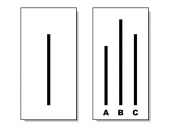In October 2006, Google Inc. announced that it had reached a deal to acquire YouTube for US$1.65bn in Google Stock. The deal closed in November 2006.
I take up the negotiations from Friday October 9th 2006, with Google in talks to acquire YouTube after bidding 1.65Bn for it. Google will pay YouTube in Google stock which means that the owners could have a lot more than the $1.65bn in a few years time if Google continues to grow. YouTube investors Sequoia are rumoured to take $480M of this stock portfolio. Google claim that if negotiations are successful and the acquisition goes through, "YouTube will operate independently to preserve its successful brand and passionate community".
Google Inc. is an American public corporation, earning revenue from advertising related to its Internet search, e-mail, online mapping, office productivity, social networking, and video sharing services as well as selling advertising-free versions of the same technologies.
Google was co-founded by Larry Page and Sergey Brin while they were students at Stanford University and the company was first incorporated as a privately held company on 4 September 1998 (Wikipedia.org). YouTube is a video sharing website where users can upload, view and share video clips. YouTube was created in February 2005 by three former PayPal employees (Wikipedia.org).
For Google the purchase gave the company the capabilities to tap into the potentially lucrative online video and social networking markets as some market analysts at the time criticised Google for being too connected and reliant on advertising linked to keyword searches. This acquisition would further strengthen Google's stranglehold on online advertising and would give it an advantage over rivals such as Yahoo, Microsoft, MSN and NewsCorp (the company that owns MySpace). Experts at this time also felt that Yahoo, Microsoft & NewsCorp expressed an interest in buying YouTube, which probably stung Google into action, and precipitated their bid.
Bill Tanner, the General Manager of Hitwise, believed that because of this bid MySpace would need to promote its own video service more aggressively on its site to combat the Google-YouTube alliance. Martin Pyykkonen, an analyst with Global Crown Capital, viewed Google's bid as a pre-emptive strike on rivals Yahoo, who were rumoured to be in negotiations with Facebook. Another analyst, Clayton Moran of Stanford, opined that Google made this bid in order to become more competitive with MySpace, which was ranked in second place in online video market share at this time.
Google bid this high price for YouTube ,even though YouTube is at present unproven with regard to its revenue potential, as it needs to combat the growth of MySpace and also to help Google extend its highly successful text-based search platform into video.
Eric Schmidt, the CEO of Google, at this time said that this acquisition, if it went through, would be one of "many investments" that Google planned to make in online video. He is convinced that the Google YouTube combination would make Google more desirable to advertisers, as "this is just the beginning of the Internet video revolution". Chad Hurley, CEO and co-founder of YouTube, feels that this alliance will allow YouTube to focus even more on copyright protection since Google has more financial and technical resources to dedicate to this issue."Academic ReferencesAdair, W., & Brett, J.M. (2003). "The negotiation dance: Time, culture, and behavioural sequences in negotiation". Working paper, Dispute Resolution Research Centre, Northwestern University, Evanston, IL.
Bazerman, M.H., Neale, M.A. (1992). Negotiating Rationally. New York: Free Press.
Bazerman, M. H. & Gillespie, J.J. (1999). "Betting on the future: The virtues of contingent contracts". Harvard Business Review, 77 (4).
Baron, R.A. (1990). "Environmentally induced positive affect: Its impact on self-efficacy, task performance, negotiation, and conflict". Journal of Applied Social Psychology, 20 (5).
Carnevale, P.J., & Isen, A. (1986). "The influence of positive affect and visual access on the discovery of integrative solutions in bilateral negotiations". Organizational Behavior and Human Decision Processes.
Drolet, A.L., & Morris, M.W. (2000). "Rapport in conflict resolution: Accounting for how non-verbal exchange fosters cooperation on mutually beneficial settlements to mixed-motive conflicts". Journal of Experimental Social Psychology.
Fisher, R., & Ury. W. (1981). Getting to Yes. Boston: Houghton Mifflin.
Fisher, R., Ury, W., & Patton, B. (1991). Getting to Yes, 2nd ed. New York: Penguin.
Forgas, J.P. & Moylan, S.L. (1996). " feeling good and getting your way: Mood effects on expected and actual negotiation strategies and outcomes". Unpublished manuscript, University of New South Wales.
Froman, L.A.,& Cohen, M.D. (1970). "Compromise and logroll: Comparing the efficiency of two bargaining processes". Behavioural Science.
Galinsky, A. & Mussweiler, T. (2001). "First offers as anchors: The role of perspectives-taking and negotiation focus". Journal of Personality and Social Psycology,81 (4)Hyder., E.B., Prietula, M.J., & Weingart, L.R. (2000). "Getting to best: Efficiency versus optimality in negotiation". Cognitive Science, 24(2).
Isen, A.M. (1987). "Positive affect, cognitive processes, and social behaviour". In L. Berkowitz (Ed.), Advances in Experimental Social Psychology, vol.20. San Diego, CA: Academic Press, Inc.
Isen, A.M., Daubman, K.A., & Nowiecki, G.P. (1987). "Positive affect facilitates creative problem solving". Journal of Personality and Social Psychology, 52.
Kelley, H. H. (1996). "A classroom study of dilemmas in interpersonal negotiations". In K. Archibald (Ed.), Strategic Intervention and Conflict. Berkeley, CA: University of California, Institute of International Studies.
Lax, D.A.,& Sebenius, J.K. (1986). The Manager as Negotiator. New York: Free Press.
Levine, J. & Thompson, L. (1996). "Conflict in groups". In E.T. Higgins & A. Kruglanski (Eds.) Social Psychology: Handbook of Basic Principals. New York: Guilford.
Massick, D.M. (1993). Equality as a decision heuristic. In B.A. Mellers & J. Baron (Eds.), Psychological Perspectives on Justice. New York: Cambridge University Press.
Medvec, V.H., Leonardelli, G., Claussen-Schulz, A., & Galinsky, A. (2004) "Maximizing outcomes and maintaining relationships: Multiple equivalent offers in negotiations". Working paper.
Morgan,P. & Tindale,R.S. (2002). "Group vs.individual performance in mixed-motive situations: Exploring the inconsistency". Organizational Behavior and Human Decision Process, 87(1).
O'Connor, K.M. (1994). Negotiation Teams: The impact of Accountability and Representation Structure on Negotiator Cognition and Perfomance. Eugene, OR: International Association of Conflict Management.
Pruitt, D. G. & Carnevale, P.J. (1993). Negotiation in Social Conflict. Pacific Grove, CA: Brooks-Cole.
Schatzki, M. (1981). Negotiation: The Art of Getting What You Want. New York: New American Library.
Shell, G.R. (1999). Bargaining for Advantage: Negotiation Strategies for Reasonable People. New York: Viking.
Thompson, Leigh, (2004) The Mind and Heart of the Negotiator, 3rd edition, Prentice Hall.
Thompson, L. (1991). "Information exchange in negotiation". Journal of Experimental Social Psychology, 27(2).
Thompson, L. (1995a). "The impact of negotiation on intergroup relations". Journal of Experimental Social Psychology, 29(4), 304-325.
Thompson, L., Peterson, E., & Brodt, S. (1996). "Team negotiation: An examination of integrative and distributive bargaining". Journal of Personality and Social Psychology, 70(1)Thompson, Leigh, (2004) The Mind and Heart of the Negotiator, 3rd edition, Prentice Hall.
Ury, W.L., Brett, J.M., & Goldberg, S.B. (1988). Getting Disputes Resolved: Designing Systems to Cut the Costs of Conflict. San Francisco: Jossey-Bass.
Walton, R.E. & McKersie, R.B. (1965). A behavioral Theory of Labour Relationships. New York: McGraw-Hill.
Web list:http://www.pvrwire.com/2006/10/10/google-youtube/http://www.zatznotfunny.com/2006-10/google-buys-youtube-advertisers-rejoice/http://www.downloadsquad.com/2006/10/09/googles-youtube-acquisition-is-official/http://www.tvsquad.com/2006/10/09/its-official-google-is-buying-youtube/http://www.dvguru.com/2006/10/09/google-and-youtube-its-official/http://www.pvrwire.com/2006/10/09/its-official-google-buys-youtube/http://www.google.com/intl/en/press/pressrel/google_youtube.htmlhttp://www.techcrunch.com/2006/10/09/google-has-acquired-youtube/http://www.dvguru.com/2006/10/10/gootube-match-made-in-heaven/http://blogmaverick.com/2006/10/09/i-still-think-google-is-crazy/http://calacanis.com/2006/10/06/google-to-buy-youtube-perfect-match/http://www.clickz.com/3623636http://www.iht.com/articles/2006/10/06/business/google.php


